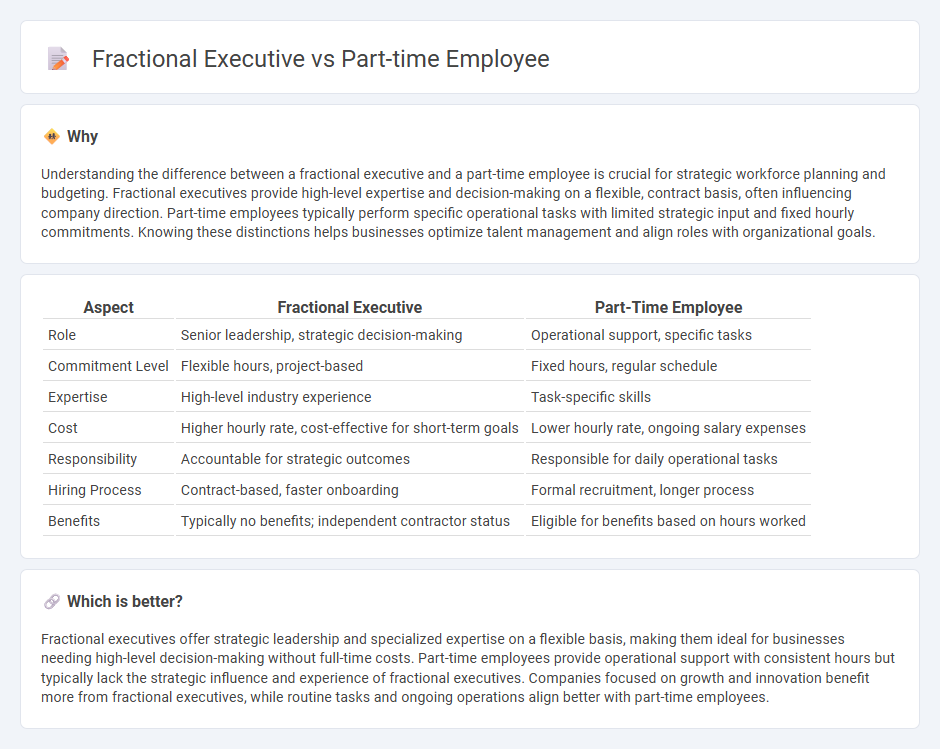
Fractional executives bring specialized leadership and strategic expertise to companies on a contract basis, often working with multiple organizations simultaneously. Part-time employees typically fill operational roles with limited hours and focus on specific tasks without taking on high-level decision-making responsibilities. Explore how choosing between fractional executives and part-time employees can impact your business growth and efficiency.
Why it is important
Understanding the difference between a fractional executive and a part-time employee is crucial for strategic workforce planning and budgeting. Fractional executives provide high-level expertise and decision-making on a flexible, contract basis, often influencing company direction. Part-time employees typically perform specific operational tasks with limited strategic input and fixed hourly commitments. Knowing these distinctions helps businesses optimize talent management and align roles with organizational goals.
Comparison Table
| Aspect | Fractional Executive | Part-Time Employee |
|---|---|---|
| Role | Senior leadership, strategic decision-making | Operational support, specific tasks |
| Commitment Level | Flexible hours, project-based | Fixed hours, regular schedule |
| Expertise | High-level industry experience | Task-specific skills |
| Cost | Higher hourly rate, cost-effective for short-term goals | Lower hourly rate, ongoing salary expenses |
| Responsibility | Accountable for strategic outcomes | Responsible for daily operational tasks |
| Hiring Process | Contract-based, faster onboarding | Formal recruitment, longer process |
| Benefits | Typically no benefits; independent contractor status | Eligible for benefits based on hours worked |
Which is better?
Fractional executives offer strategic leadership and specialized expertise on a flexible basis, making them ideal for businesses needing high-level decision-making without full-time costs. Part-time employees provide operational support with consistent hours but typically lack the strategic influence and experience of fractional executives. Companies focused on growth and innovation benefit more from fractional executives, while routine tasks and ongoing operations align better with part-time employees.
Connection
Fractional executives and part-time employees both provide companies with flexible workforce solutions that optimize operational efficiency while controlling costs. Fractional executives bring specialized leadership expertise on a part-time basis, complementing the roles of part-time employees who handle essential daily tasks without a full-time commitment. This synergy supports scalable business growth by aligning high-level strategic guidance with adaptable staffing models.
Key Terms
Work Hours
Part-time employees typically work a set number of hours weekly, often filling roles that require direct, ongoing support within a company's daily operations. Fractional executives provide high-level strategic leadership and specialized expertise for a limited number of hours, often on a monthly basis, aligning with specific business goals without the commitment of full-time employment. Discover how choosing between part-time employees and fractional executives can impact your organization's flexibility and strategic growth.
Responsibility Level
Part-time employees typically handle specific tasks within a limited scope, reporting to supervisors and following predefined instructions, which results in a lower level of strategic responsibility. Fractional executives assume high-level leadership roles, overseeing company-wide decisions, driving growth initiatives, and managing key operational functions on a part-time basis. Explore the distinctions further to understand how varying responsibility levels impact organizational success.
Compensation Structure
Part-time employees typically receive hourly wages or fixed salaries with limited benefits, aligning compensation directly to the hours worked. Fractional executives, however, are compensated through retainer fees or project-based payments reflecting their strategic impact and expertise over a set period. Explore deeper insights into how these compensation structures influence organizational dynamics and budgeting.
Source and External Links
Part-time job - A part-time job is employment with fewer hours than a full-time job, commonly under 30 hours per week, often organized in shifts and sometimes required by the nature of the work.
Part-time Employee: HR Terms Explained - Pelago - A part-time employee works fewer hours than full-time standards, typically less than 20 to 35 hours per week, and may receive pro-rated salary and benefits depending on hours worked.
Part-Time vs Full-Time: How Many Hours & How to Classify? - Part-time employees are generally those working less than 30 hours per week, often paid on a prorated basis and may have limited benefits compared to full-time employees.
 dowidth.com
dowidth.com